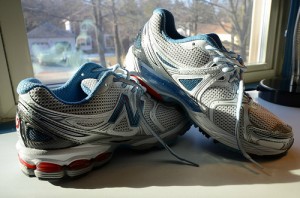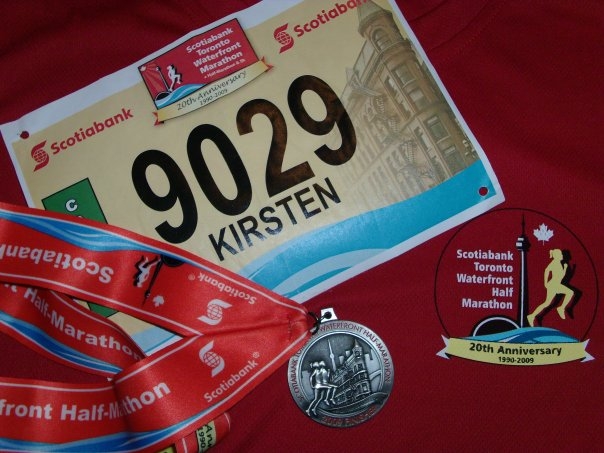I am participating in the 2012 Wordcount Blogathon, which means one post every day for the month of May.
This time tomorrow, I will be about an hour and a quarter into the half-marathon I’ve been training for since February. If things go according to plan, I will have a little less than 10km to go. I will have been injected with the mental boost that comes from passing the halfway mark, and I will be mentally preparing strategies to overcome the energy crash that usually happens at around 18km. I will be visualizing myself crossing the finish line, hopefully with a personal best half-marathon time under my belt.
But that’s all tomorrow. Today I have to get through my final day of pre-race freak-out. I am a bag of nerves and my body is trying to play its usual tricks on my mind. And somehow, while these butterflies create havoc in my stomach, I have to get myself organized for tomorrow, and make sure my body has the nutrients and hydration in place to go the distance.
I have run my share of races, so I have been through this enough times to be in a position to share a few hard-earned points of wisdom with runners who suffer from pre-race jitters.
1. Your body is thirsty. As athletes, we all know that we’re supposed to drink x-number of glasses of water a day. But some of us aren’t as diligent about it as we should be. If I was better about my general hydration needs, maybe it would kick up my race performance a notch. It would certainly be better for my overall health. As lax about it as I am, I always make a special effort to hydrate properly the day before a race. It does mean more trips to the bathroom, but going into the race with at least a day’s worth of proper hydration behind me really does make a difference.
2. Watch what you eat. This one seems obvious. We want our bodies to be properly fueled for the big event. Don’t go nuts on the carbs: it’s actually better to do your carbo-loading two days before the race. The day before, you want to keep your diet simple and healthy. My pre-race day nutrition consists of lean protein, very little fat, and a small amount of carbs. That is what works for me, and it is important to note that something quite different could work for someone else.
3. Now is not the time for experimentation. If you just bought a new pair of six-inch heels, wait until after the race to break them in. Especially if you’re a dude. Keep that new jar of miracle wonder-vitamins in your medicine cabinet with the seal intact. If you’ve never had super-hot Thai curry, don’t eat it today. Everything you wear today should be something you’ve worn before, and everything you eat or drink should be something that you know from experience is tolerated well by your body.
4. Remember that your training is done. Going out for “one last speed training run” is going to serve absolutely no purpose, and may in fact do you harm. It is easy to worry, on the last day, about whether you have done enough training. You start to obsess about the week you had to take off due to a cold, or the fact that you had to cut short your last long run because you turned your ankle on an uneven paving stone. Remember that training is not an event, it’s a process, and you will have built your base long ago. The best thing you can do today is loosen up with an easy run around the block, and then rest for the remainder of the day.
5. Do stuff you like. You are tense and nervous, and you need to relax. Don’t worry about the things you should be doing. They can wait. Keep yourself busy with activities that will relax your mind and help you chill out a little. For me, it’s writing and messing around on my laptop. For someone else, it might be reading or watching TV. If you actually enjoy washing dishes and doing the laundry, knock yourself out. Come and do mine while you’re at it.
6. Prepare your running outfit. You don’t want to be fiddling around with safety pins and your race bib while you’re lined up at the start line ten minutes before the siren goes off. The day before the race, you actually want to put on the clothes you will be wearing, along with your heart rate monitor and whatever fuel belt you will be using. Then you can pin your number to your shirt, and experiment with ways to make the number work with everything else you are wearing. Men and flat-chested women have an easier time of this, simply because they have a larger available flat surface. For women like me who are more rounded on top, more coordination is sometimes required. Don’t wait until race day to figure it out.
7. Pack your bag. Most races have bag check facilities, and it’s well worth taking advantage of them. My bag typically contains several bottles of water for before and after the race, the pre-race snack that I eat right after I get to the start (about an hour before the run begins), a light jacket and track pants to put on after the race, and an alternative set of running clothes just in case I get to the start and find that I have miscalculated the weather. Your race bib usually comes with a bag check tear-off strip at the bottom. Remove this from the bib and attach it to your bag.
8. Get plugged in. Charge up your training watch, your iPod, and any other electronic gadgets that you are taking. Getting to the race and seeing the “battery low” message flashing on your watch can be very disorienting. Leave your goods plugged in for the day, and then unplug them and leave them with your race clothes before you go to bed.
Pre-race jitters are normal, and in some ways they are beneficial. They give your adrenaline a handy boost leading up to the race. Don’t fight the jitters, embrace them. Coexist with them as you go about your final race day, getting yourself ready.
And then, when it’s time to line up at the start, enjoy the run and visualize how great it will feel to cross the finish line.











